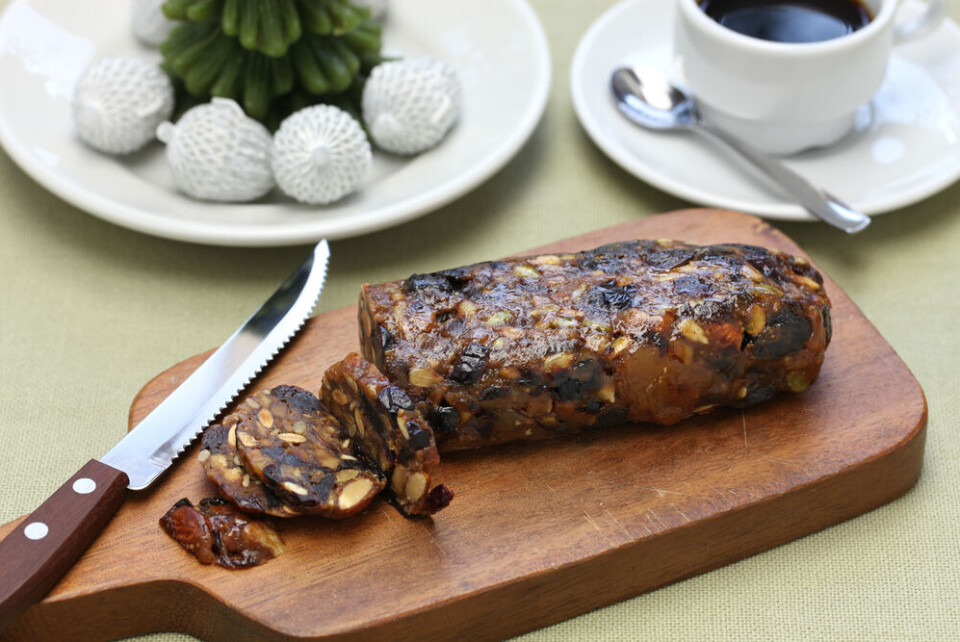-
Recipe: taste this chocolate trompe l’œil salami
Melt any leftover Easter eggs and add shortbread, nuts, cranberries and marshmallows to make this fun treat
-
Recipe: rich lamb shanks with vegetable tian
This dish would make the perfect centerpiece for Easter lunch
-
Recipe: fresh fava bean and asparagus salad
Source seasonal produce and garnish with mint, goats cheese and lemon
Day 10 French regional Christmas specialities: Beerawecka from Alsace
This needs to be baked days ahead if you want it on your table for Christmas

Every day from December 1-12, The Connexion will be sharing a French regional Christmas speciality. Today we look at beeraweckafrom Alsace.
What is beerawecka?
Beerawecka is a traditional cake from Alsace, made with dried and caramelised fruits. Its main characteristic is that it does not contain any dough.
Many people wrongly believe the name comes from the Alsatian words ‘beera’ (pear) and ‘wecka’ (a small type of bread).
In fact, the name comes from the Jewish community in Alsace and many make it to celebrate the Jewish holiday Pesach in April. It was called ‘Pessa’h wecka’ in Yiddish, and over time the Alsatian version came to be known as ‘beerawecka’.
However it is called ‘schnitzwecka’ in the Munster valley (Haut-Rhin), ‘hutzelbrot’ in the Bas-Rhin, and ‘hogey’ in the Pays Welche, an area of Alsace bordering the Moselle and Vosges departments.
Many Alsatian families choose a variety of dried fruits for their version - often pear, apricot or fig - and marinate their caramelised fruits in eau-de-vie, such as quetsch liqueur or schnapps.
As with many dense Christmas cakes, it is high-calorie, with fitness app MyFitnessPal listing it as containing 270 to 330 calories per 100 grams.
How to bake your own beerawecka?
Popular French TV chef Julie Andrieu went to Alsace to bake her own beerawecka in an episode of her TV show Les Carnets de Julie.
Beerawecka is easy to make. For three people, you will need 400 grams of dried pears, 100 grams of quetsche fruit (a type of Alsace plum), 150 grams each of dried figs, apricots, apples and raisins; and 100 grams each of almonds, hazelnuts and any other nuts.
You then cut the dried and caramelised fruits into thin pieces, and marinade them in eau-de-vie overnight in the fridge.
The following morning, add 20 grams each of ground cinnamon, cloves, and star anise; plus 20 grams of plain flour with a tablespoon of bicarbonate soda to serve as baking powder.
Mix it all together, then shape the mixture into as many beerawecka as you wish.
Brush the ‘logs’ with egg yolk and put in the oven for between 45-60 minutes at 180C.
Then, leave it to rest while sealed for about 10 days to bring out the best of the flavour, before eating.
Related articles
Day 1 of French regional Christmas specialities: Crépinettes
Day 2 of French regional Christmas specialities: Bredeles of Alsace
Day 3 of French regional Christmas specialities: Foie gras
Day 4 of French regional Christmas specialities: Chapon farci
Day 5 of French regional Christmas specialities: Treize desserts
Day 6 of French regional Christmas specialities: Vin chaud
Day 7 of French regional Christmas specialities: Pain d’épices
Day 8 French regional Christmas specialities: Cardons from Rhône-Alpes
Day 9 French regional Christmas specialities: Escargots persillés
























